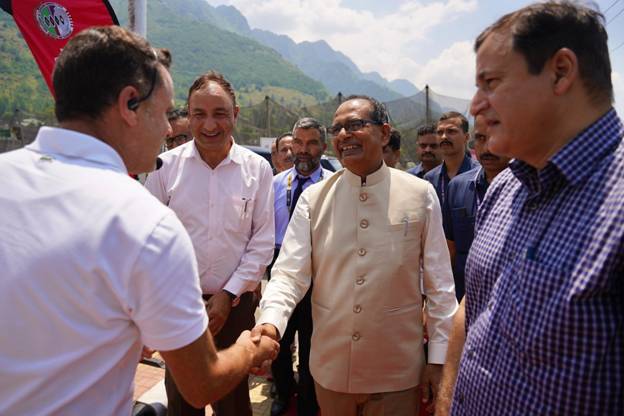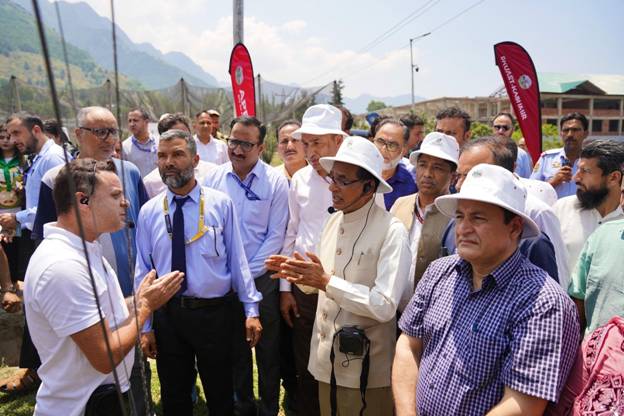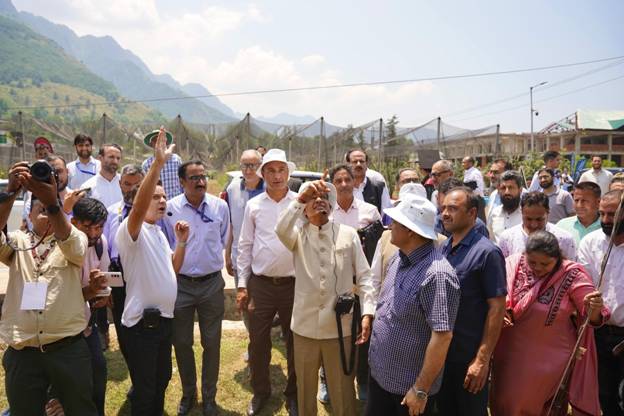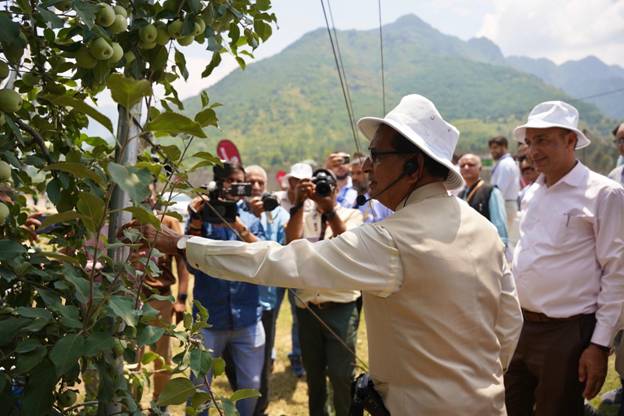Ministry of Agriculture &
Farmers Welfare
Union Minister Shri Shivraj Singh Chouhan Visits SKUAST-K Horticulture Gardens; Holds Stakeholder Meeting on Agriculture and Allied Sectors
Posted On:
04 JUL 2025 5:17PM by PIB Delhi
Union Minister for Agriculture and Farmers’ Welfare and Rural Development, Shri Shivraj Singh Chouhan today visited the horticulture research and demonstration blocks of Sher-e-Kashmir University of Agricultural Sciences and Technology of Kashmir (SKUAST-K), Shalimar. As part of his two-day visit to Jammu & Kashmir, the Minister reviewed on-ground innovations in horticulture and later held an extensive interaction with key stakeholders from the agriculture and allied sectors.

During his visit to the SKUAST-K campus, the Union Minister was briefed on several scientific advancements in horticulture being implemented in the Valley. He reviewed a high-yielding variety of apple capable of fruiting within the first year of plantation, significantly reducing the gestation period for orchard productivity. He also observed protective netting systems designed to prevent damage from hailstorms, scientific pruning methods, and efficient water and nutrient management techniques adopted for improving yield and income. Growers who have adopted these modern practices shared their experiences with the Minister and spoke about the increased production and stability in income achieved in recent years.

The Minister also interacted with students from different parts of the country currently studying at SKUAST-K. The students had displayed horticultural produce including apples, apricots, walnuts, almonds, and berries, along with post-harvest innovations such as cold-stored apples preserved for over six months. Shri Chouhan appreciated the student-led efforts and noted SKUAST-K's emergence as a vibrant hub of agricultural learning and innovation.

Following the field visit, Shri Chouhan held a detailed interaction with stakeholders from across the agriculture value chain, including farmers, beekeepers, cold storage owners, and nursery operators. The interaction provided a platform for open dialogue on both opportunities and challenges in the sector. The attendees appreciated the Government of India’s commitment to farmers’ welfare, and lauded several key initiatives including the Prime Minister’s vision for a Viksit Jammu & Kashmir, the GI tagging of traditional local produce, subsidies and support extended to farmers, and the promotion of high-density plantation through the Mission for Integrated Development of Horticulture (MIDH).

During the meeting, several issues were raised by participants. Saffron growers highlighted the need for improved irrigation facilities and requested the proper utilisation of 128 borewells. They also sought enhanced research and institutional support to improve production quality and compete with international saffron, especially from Iran, while raising concerns about the impacts of climate change on their crops.
Beekeepers requested the introduction of insurance schemes to protect their livelihood, financial assistance in the form of affordable credit, and stricter regulation of pesticide use in horticulture which adversely affects bee populations. They also called for increased research to boost honey production.
Apple growers shared their concerns over the damage caused by changing weather patterns, particularly global warming and hailstorms. Marginal growers, in particular, spoke about their vulnerability due to small landholdings. They urged the government to ensure the availability of quality inputs at affordable prices, including a reduction in pesticide costs.
Cold storage operators raised the need for crop insurance and fair procurement rates to ensure price stability for farmers. They called for competitive input pricing on par with other hill states like Himachal Pradesh and Uttarakhand. The issue of market disruption due to the influx of outside produce in cities like Hyderabad and Chennai was also discussed, along with the demand for higher subsidies on high-capacity cold storage units ranging from 5,000 to 6,000 metric tonnes.
Nursery operators requested improved logistics and transportation mechanisms, including a dedicated railway-based policy for the timely and cost-effective movement of planting material across the country.
Responding to the concerns, Shri Shivraj Singh Chouhan stated that engaging directly with farmers and stakeholders is not merely an administrative task but a form of seva – service to the nation. He reiterated that agriculture remains the backbone of India’s economy and assured stakeholders that the government stands with them from “seed to shelf.” He stressed that increasing farmer income remains the central goal of the government’s agricultural policy.
The Minister underlined the need for greater research and innovation to help small and marginal farmers compete globally. He informed that scientists from ICAR have been directed to spend more time in the field and engage with farmers to understand their challenges first-hand. He announced that Clean Plant Centres are being set up in consultation with the Chief Minister to provide disease-free planting material. Private nurseries, he added, would be provided with subsidy support, and the Horticulture and Agro-Processing Development Limited (HADPL) would be encouraged to carry forward these initiatives.
The Minister outlined the government’s broader plan to transform Jammu & Kashmir into a leading horticulture hub. He spoke of efforts to reduce dependency on imports and the introduction of competitive import duties to protect local produce. Support for export infrastructure, access to expert guidance, and better logistics — including railway connectivity — are also part of the vision to make Kashmir’s produce globally competitive.
Shri Chouhan also made a strong commitment to reform the pesticide ecosystem. He announced that measures would be taken to ensure the quality and affordability of pesticides, with stringent penalties, including imprisonment, for those dealing in substandard or harmful products. He emphasized the need to ensure fair pricing structures so that farmers can retain a higher share of profits.
In his concluding remarks, the Union Minister reaffirmed his personal dedication to the welfare of farmers. He said his phone remains open to anyone in need and that for him, public service is meaningful only when it is heartfelt and grounded in the lives of the people.
The visit marked an important step in the Centre’s efforts to strengthen agricultural productivity, improve farmer livelihoods, and ensure sustainable and inclusive development across Jammu & Kashmir.
******
RC/KSR/AR
(Release ID: 2142234)
Visitor Counter : 2